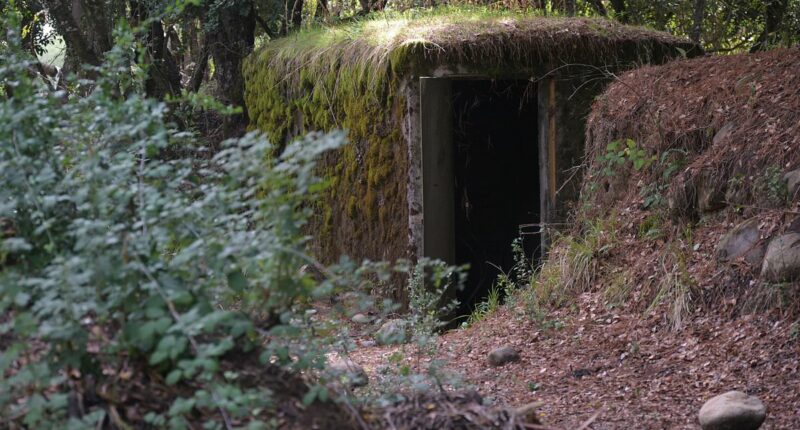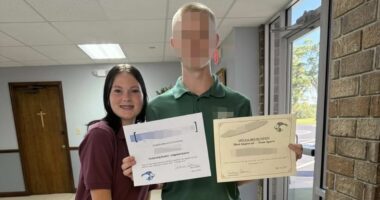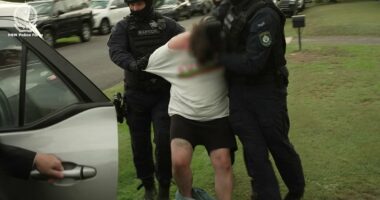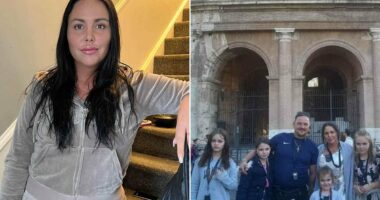Share this @internewscast.com
Located amidst the gentle hills of central Chile, Villa Baviera resembles a serene village with red-tiled roofs, well-kept lawns, and verdant forests.
But, beneath the picture-book setting lies a chilling past.
Once known as Colonia Dignidad, it used to be a secretive paedophile sect established by a one-eyed Nazi after he fled Germany.
Overseeing a reign of terror, Paul Schaefer was responsible for the routine torture and exploitation of child slaves at the commune in Parral, south of Santiago, for more than thirty years since its founding in 1961.
He established the cult by convincing followers to sell their belongings in Germany and relocate to Chile, promising to create a religious farming commune and charity.
Schaefer imposed a regime of harsh punishments and humiliation on the residents, including cruelly separating children from their parents.
The monster also collaborated with the dictatorship of Augusto Pinochet whose secret police used the colony as a place to torture opponents.
The full extent of the horrors committed at the commune, which housed up to 300 members during the 1960s and ’70s, only emerged after Pinochet’s dictatorship ended.
Schaefer died in prison in 2010, but some of the German residents stayed and have turned the former torture site into a tourist destination.

Nestled in the rolling hills of central Chile, Villa Baviera resembles a tranquil village with its red-tiled roofs, pristine lawns, and lush forests. Pictured: An aerial view of Villa Baviera Village

Previously known as Colonia Dignidad, it was a covert pedophile sect founded by a one-eyed Nazi pedophile in Parral, south of Santiago, after he escaped Germany. Pictured: A barbed wire fence encloses the secretive German colony of Villa Baviera

Paul Schaefer (pictured) oversaw daily torture and abuse of child slaves living at the commune for over three decades since founding it in 1961

The entrance of one of the bunkers used by German Paul Schaefer Schneider at Colonia Dignidad

The bulletproof window of the room of cult leader former Wehrmacht soldier Paul Schaefer is pictured in Colonia Dignidad

View of the entrance of one of the bunkers used by cult leader former Wehmacht soldier Paul Schaefer in Colonia Dignidad (Dignity Colony), now called Villa Baviera

Schaefer imposed a regime of harsh punishments and humiliation on the residents, including cruelly separating children from their parents
The community has transformed former workshops where devotees labored without pay into a hotel with glowing Trip Advisor reviews.
One person gushed: ‘This was our first travel to Villa Baviera. There was given good food and super service.
‘The atmosphere and area is very attractive. The fresh air helped us to sleep good. The staff was very friendly and capable to handle our questions. I want to go again back to visit.
The communal dining hall, one of the few places where parents in the colony could see the children who had been taken away from them, is now a public restaurant.
It celebrates Oktoberfest, and a small store sells souvenirs and homemade pastries and sausages.
The tourism complex also has a small lagoon with paddle boats, a pool, hot tubs and bicycles for rent.
Services include wedding ceremonies and so-called historical tours through the former leader’s bedroom, where he abused boys, and the hospital, where followers were drugged and tortured.
For decades, the residents of Villa Baviera, initially called Colonia Dignidad, submitted to the authoritarian whims of Schaefer, who banned almost all contact with the outside world at the commune 210 miles south of Santiago.
Under his rules, men and women lived separately, intimate contact was controlled and children were split from their parents.

Schaefer formed the cult after persuading followers to sell their possessions in Germany and move to Chile to form what he said would be a religious farming commune and charity

View of the Villa Baviera Hotel in Colonia Dignidad (Dignity Colony), now called Villa Baviera, near Parral, Maule Province, Chile on April 15, 2025

Schaefer was born in Troisdorf, Weimar Germany, in 2921 and joined the Hitler Youth movement at a young age

Pictured: View of the Villa Baviera Hotel in Colonia Dignidad

The tourism complex also has a small lagoon with paddle boats, a pool, hot tubs and bicycles for rent

Schäfer died in prison in 2010, but some of the German residents stayed and have turned the former torture site into a tourist destination. Pictured: An artificial lagoon created by settlers in Villa Baviera

View of the guesthouse in Colonia Dignidad
In 2006, former members of the cult issued a public apology and asked for forgiveness for 40 years of sex and human rights abuses in their community, saying they were brainwashed by Schaefer, who many viewed as God.
The enclave’s history features in a movie called Colonia, released in 2015, starring Emma Watson and Daniel Bruehl.
Schaefer was born in Troisdorf, Weimar Germany, in 1921, and joined the Hitler Youth movement at a young age.
He served as a medic in the German Army during World War II, where he reached the rank of corporal.
As an ex-Nazi, he lived in Germany until 1961.
Following the war he set up a children’s home and Lutheran evangelical ministry. In 1959, he created the Private Social Mission, purportedly a charitable organisation.
That same year, he was charged with sexually abusing two children and fled Germany with some of his followers.
Schaefer resurfaced in Chile in 1961, where the government at the time, led by conservative President Jorge Alessandri, granted him permission to create the Dignidad Beneficent Society on a farm outside of Parral.

As an ex-Nazi, Schaefer lived in Germany until 1961. Pictured: Paul Schaefer is transferred from a police station to a prison in Buenos Aires, late March 10, 2005

Workers and German colonists hold up a banner that reads ‘Welcome to Baviera Hotel’ in preparation for the opening of a hotel run by German colonists at Villa Baviera in 2012

This aerial view shows Villa Baviera Village, formerly known as Colonia Dignidad (Dignity Colony), now called Villa Baviera, near Parral, Maule Province, Chile on April 15, 2025
Founded primarily on anti-communism, this society evolved into the Colonia Dignidad community.
Schaefer disappeared on May 20, 1997, fleeing child sex abuse charges, this time filed by Chilean authorities after 26 children who went to the commune’s free clinic and school reported abuse.
He was tried in Chile in his absence, and found guilty in late 2004.
Schaefer was found on March 10, 2005, nearly eight years after his disappearance, hiding in a suburb known as Las Acacias, 30 miles from Buenos Aires, Argentina.
Following two days of negotiations between Chilean and Argentine authorities, Schaefer was sent back to Chile to face a court hearing. There, he was charged with being involved in the 1976 disappearance of the political activist Juan Maino, and he remained in custody until his death.
On May 24, 2006, Schaefer was sentenced to 20 years in jail for sexually abusing 25 children and was ordered to pay £1million to 11 minors whose representatives established suits. He died aged 89 in a Chilean jail in 2010 while serving his sentence.

Paul Schaefer, leader of a mysterious German colony in southern Chile, ignores the press after appearing in court in Parral

The community, which at its peak in the 1960s and ’70s had about 300 members, has transformed former workshops where devotees labored without pay into a hotel with glowing Trip Advisor reviews

Former leader of the Colonia Dignidad (dignity community), Paul Schaefer (C), sits in a wheelchair outside Interpol police station after questioning in Santiago, March 14, 2005
Now, the Chilean government has made the controversial decision to expropriate some of its land to to turn it into a memorial for the victims of the country’s 1973-1990 dictatorship.
Across Chile, more than 3,000 people were killed and more than 40,000 tortured during the Pinochet regime.
In June last year, President Gabriel Boric ordered that 116 hectares (287 acres) of the 4,800-hectare site, an area including the tourist complex.
But some of the inhabitants, who were separated from their families as children, subjected to forced labor, and in some cases, sexually abused, say they are being victimized all over again.
Luis Evangelista Aguayo was one of those who was forcibly ‘disappeared’.
Mr Aguayo worked as a school inspector, was a member of the teachers’ trade union and was active in the Socialist Party.
On 12 September 1973, one day after Pinochet overthrew Chile’s elected Socialist President, Salvador Allende, police came to Mr Aguayo’s house and arrested him, the BBC reported.
Two days later, he was sent to the local prison, but on 26 September 1973, police arrived and bundled him into a van. His family never saw him again.
Mr Aguayo was one of 27 people from Parral believed to have been killed in Colonia Dignidad, according to an ongoing judicial investigation ordered by the Chilean government.

German settlers’ clothes are exhibited at the Villa Baviera Hotel’s restaurant in Colonia Dignidad

In this file photo taken on January 20, 2016 a German boy rides his bicycle in Villa Baviera or Bavaria Village, formerly known as Colonia Dignidad
The total number of people murdered here is not known, but there is evidence that this was the final destination of many opponents of the Pinochet regime, including Chilean congressman Carlos Lorca and several other Socialist Party leaders.
The Chilean justice ministry says investigations suggest hundreds of political detainees were brought here.
Ana Aguayo, Luis’ sister, supports the government’s plan to create a site of memory there.
‘It was a place of horror and appalling crimes. It shouldn’t be a place for tourists to shop or dine at a restaurant,’ she told the BBC.
But the government’s expropriation plans have divided opinion in Villa Baviera, which has fewer than 100 residents.
Dorothee Munch was born in 1977 in Colonia Dignidad.
The government plans to expropriate 117 hectares of the 4,829-hectare site, including buildings where torture took place, and sites where victims’ bodies were exhumed, then burnt and their ashes deposited.
Ms Munch disagrees with the expropriation plans because they include the centre of the village, encompassing the residents’ homes and shared businesses including a restaurant, hotel, bakery, butchers and a dairy.

















